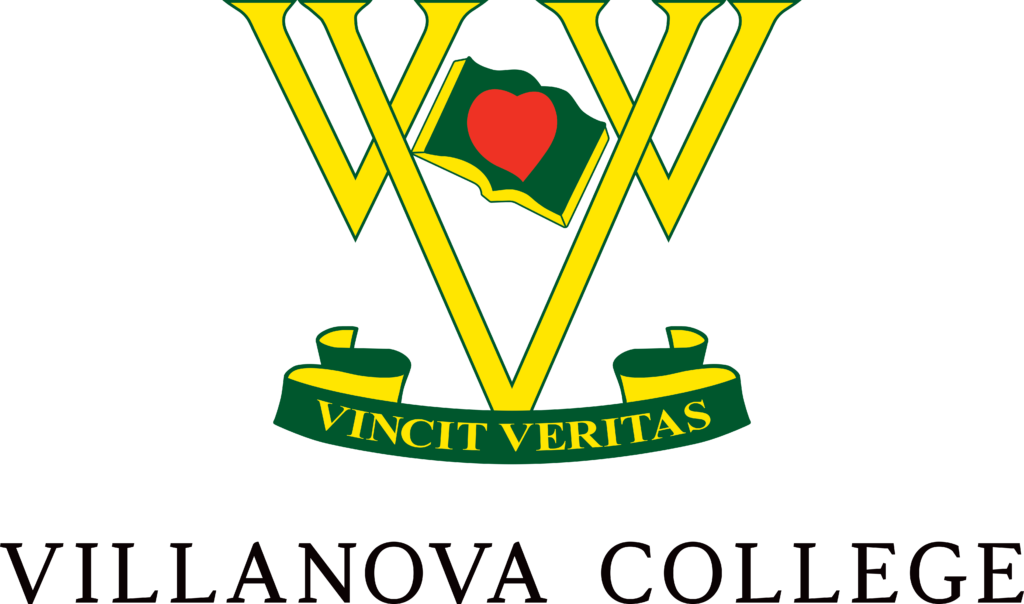We are in the final weeks. This week our Seniors of 2024 graduate, our Vinnies hampers have been being delivered, and the majority of the school move into exams and assessments. For all of us there is a common theme of drawing together our learnings from the year.
In the last week I have made the enormous decision to move on from Villanova College. It is a letting go that comes with lots of emotion for me as I have loved the work and loved the community here at Villa very deeply.
There is a story I tell on our AFAS immersions. It belongs to an Aboriginal man who wandered into a campfire circle in the Northern Territory who shared the story with a lecturer of mine, Tony Kelly. He was gone in the morning, but the story was passed to me. I share it with you as it echoes my lived experience at Villa.
If you stand in a place that you love,
the wind will come and knock you down.
If you stand in a place that you love,
with people that you love,
you can walk, but you will not know in which direction to go.
If you stand in a place that you love,
with people that you love,
doing work that is good for you and good for them,
you will be strong like the kangaroo,
and the kangaroo cannot jump backwards!
Here at Villa I have stood in a place that I have loved.
We have the big view here. Our community is perched on the hill, we are positioned to hold the bigger picture, to take in not only what is happening for us personally but to hold a larger view, to see across all that is happening in our city. It is a gift and a responsibility. The young men at Villa do get a fantastic education and this comes with an opportunity to build a better world, to ensure we use what we learn for the good of all. Many of our students end up in places where they can influence change and make decisions that will improve the lives of others. We want all students to use their gifts and talents for the good of all.
Here at Villa I have been with people that I have loved.
From my first to last day at Villa there has been a clear priority on connection and relating. It is what works in educating the whole of young people, because we first and foremost meet each other. It is not only what we learn, but how we learn together.
Here at Villa I have engaged in work that I have loved.
The Augustinian tradition is so deep and rich. My work in the formation of identity and in mission is so energising. I am so grateful for the extraordinary team of staff I have worked with at Villa – for their professionalism, for their passion, for their sense of justice and fun. To our students too – I have delighted in you – in your generosity, in your can-do ability, in your laughter, in your effort. I have found great joy in my work here at Villa. We have been strong like the kangaroo and we have taken jumps forward. I know this will continue.
A million thanks for the time shared in the last four years. I’ll be not too far away at Ambrose Treacy College, and I’ll be cheering you on from there. I’d like to leave you with an invitation to grab a cuppa and sit with a reflection from Br Damien Price about this time when our Year 12s graduate, it has been echoing deeply for me this week. There are also a couple more stories from the Philippines to share.
The carpet of purple petals has now begun to fade – it is time.
It is time to leave the nest, to seek adventure, embrace life – truly live your one beautiful and precious life.
It is time to put away textbooks and blazers – the bleating of the herd and the pimples of adolescence.
Reach for the stars – YOUR stars and enjoy that journey.
It is time to dream your dreams and in your dreams they and them will become your brother and your sister on life’s sacred journey.
It is time – time to swim in mountain streams, plant seeds of hope, learn from pain and mistakes and embrace all that makes you YOU.
It is time – time to embrace your vulnerability – the pathway to meaning and purpose.
It is time – time to leave behind excuses, ‘what ifs’ and ‘why me’s’
It is time – time to embrace responsibility – YOUR world, your whisper, your voice – your adventure
It is time – time to ask ‘Why Ukraine?’ and be part of the ‘never again’!
It is time – time to walk ever more gently upon Mother Earth: listen to her seasons, learn from her generosity, know that she, like you, is fragile but holy.
It is time – time to dance until your feet hurt, write that poetry, sing YOUR song and do what is deeply in YOUR heart to do.
It is time – time to name the shallow and the plastic – the vaping, the binge, the powder or pill that is a road to nowhere but despair and compromise – your noble birthright sold to some dealer in pain.
It is time – time to look into the mirror and love what you see – warts and all.
It is time – time to be all that YOU can be – and more.
It is time – time to trust the journey within that has brought you to this place and to this time.
It is time – time to trust your heart’s longings.
It is time – your time of small steps of courage, small seeds of hope, small moments of beauty.
It is time – time to choose – the road less travelled by – your noble road.
It is time – time to be nothing less and nothing more that YOUR best self.
It is time – one small step at a time – one small choice at a time – each getting up again, each reaching out again, each embracing again – making you the courage, the hope and the gift that this beautiful world so desperately needs!
It is time – YOUR time and your time becomes OUR time – in the family of humanity, the village of planet Earth and a Universe wrapped in love.
It is time – time to KNOW intimate within you – that the mystery that is love, the mystery we call God – wraps your time, tickles that dream and that adventure – and will smile at every one of your small but precious steps.
Go with that God!
“God grant me the serenity to accept the things I cannot change
Courage to change the things I can and
Wisdom to know the difference!”
“I shall be telling this with a sigh
Somewhere ages and ages hence:
Two roads diverged in a wood, and I—
I took the one less travelled by,
And that has made all the difference.”
Robert Frost
More stories from our AFAS immersion Program
Good Samaritan house
On Monday 16 we went to the Good Samaritan house to participate in a feeding program that provides meals and a safe space to young children and adults that are struggling in Cebu. The Good Samaritan house also has a school system which provides children with an education.
One of the first things I noticed was how small the classrooms are. Four kids were sitting at benches that are designed to fit two. They also had students varying in age from 3-18 years old in one room even though they learn different things based on their age. Hygiene didn’t seem to be a priority evident through the dirt seen on the students’ feet and the tears in their clothes. Some students had clothes that stretched over their body like a day was while others had shirts that barely fit them.
Another thing was the place seemed to resemble a prison. Barbed wire surrounded the outside wall preventing anyone from getting in or out except through the main gate.
The food didn’t look appetizing, but the patrons ate it. One thing I saw was that some kids saved their food in cardboard boxes to save for later. This came as a shock as I didn’t realize that some kids saved their lunch to feed their family or keep for later.
The most confronting part was how young girls were in the classroom with their children. Fifteen-year-old girls were there with their children and still attending school.
The worst part is that the sister told us that more and more women are becoming young mothers despite everything the government is doing to promote sex education.
This experience completely changed what I thought about homelessness in both the Philippines and Australia. I now realize the injustices that people face due to lack of education and lack of opportunities. When this does not change the poor continue to become poorer and won’t have any way to escape poverty.
Jonah Nicolaou
Reflection on the House of the Samaritan
During my immersion in the Philippines with AFAS, I spent time at a street kid shelter called the House of the Samaritan. It’s a place that helps kids who have grown up on the streets, giving them food, a safe place to stay, and, more importantly, hope for the future. One young man, TJ, shared his story with me, and it’s something I won’t forget.
TJ is 22 now and in his third year at university, studying to become an English teacher. But his life wasn’t always like this. He grew up on the streets, with his three younger siblings with no idea of what the future held.
Because of the shelter and the nuns work, TJ was able to go to school and dream of something more. He told me that he wants to become a teacher so he can help kids like the ones at the shelter, just like the shelter helped him. He believes in giving back and wants to make a difference in the lives of kids who come from difficult situations like he did.
Hearing TJ’s story made me realize how much a place like the House of the Samaritan can change someone’s life. It gave TJ the hope and he needed to pursue an education and a satisfying life.
Forbes Hardy
Living alongside a volcano!
The Volcanic eruption that was occurring during the time period of the trip of the immersion had led us to see devastating consequences to homes that are already facing difficult situations. When we had arrived at the school Murcia, located in Bacolod, we met a teacher named Rosalinda, whom Ms Garrone and I interviewed to learn more about what was happening. The information that she had expressed allowed us to see what they were experiencing as we don’t really get to experience that ourselves in Queensland.
During the Interview, we learnt how immediate evacuations were forced onto people and forced many people to say goodbye to their house and most likely permanently to leave their home. In my view, I didn’t really realise that people could stay up that close to the volcano until I met the school’s teacher, Rosalinda. Her family was already placed in an evacuation centre but it could be seen that if a lot of people could not financially or be helped through friends or relatives then people would have to face the situation of homelessness especially if the centre is completely full. It seemed even worse for the children and elderly as the ash can effectively make a huge impact towards their health.
Another section that was talked about was the agriculture and this was where the teacher had mentioned about how crops all over would die. There are many banana trees that are wasted. Ash also contaminates the water supplies, food, everything which is a very important aspect as people who often live close by are often farmers and that just completely ruins their source of income. Recovery is to be seen as near more impossible even with all the help that the government supplies.
In the midst of all the struggles, Ms Rosalinda, shared too about the positives. The soils are enriched with ashes. The Government does what it can in preparing evacuation plans and providing some financial assistance to those people affected.
It was confronting to realise how vulnerable these farming communities in rural areas are. Even with the Government’s help, a lot of people are facing situations like homelessness after a disaster like this. I know for sure that nobody would ever want to experience this, and nobody would ever want their kids to worry but it’s a situation that they are forced to be in.
Visiting one of our LCC scholars
Our visit to one of the scholars’ homes will remain with me for a long time. We made our way to their home on a tricycle up a road and through a muddy and potholed filled path. When we got to the humble home it was a small wooden house with two homemade bamboo beds. The small home was like a sauna with it being ten degrees hotter inside than out. It had me and all the boys drenched in sweat with five minutes. However, they were so proud of what they had.
The boys’ parents had been unable to look after them and had left them with their aging grandparents. The Grandfather is 71, and rather than enjoying retirement is still working every day in the sugar cane field and making charcoal for a basic income to pay for transportation and schooling. After seeing the house we went to the neighbour who is starting a new business raising and selling pigs. This family of four, including a toddler were building their home and their pig pens themselves. As we left we saw the land being ploughed by a buffalo. It was great to see rural life. People were so determined to do everything they could to allow the boys to gain an education.
Turlough O’Neill






